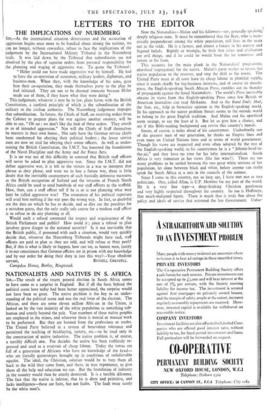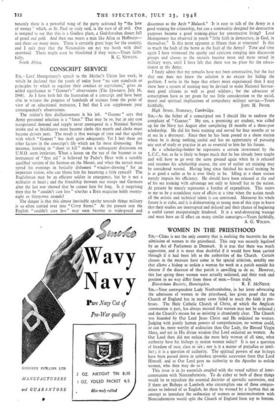NATIONALISTS AND NATIVES IN S. AFRICA
Sut,—The result of the recent general election in South Africa seems to have come as a surprise in England. But if all the facts behind the political scene here today had been better appreciated, the surprise would not have been so great. The native problem is the key to an under- standing of the political scene and was the real issue of the election. The African, and there are some eleven million Africans in the Union, is looked on by the vast majority of the white population as something sub- human and utterly beyond the pale. Vast numbers of these native peoples are employed in. the mines, and wherever there is menial or manual work to be performed. But they are banned from the professions or trades. The United Party believed in a system of benevolent tolerance and permitted the teaching of bricklaying, joinery, etc.—to be used only in the construction of native industries. The native problem is, of course, a terribly difficult one. For decades the native has been ruthlessly re- pressed and used as a reservoir of cheap labour. Today the towns are full of a generation of Africans who have no knowledge of the kraal— who are literally guttersnipes brought up in conditions of unbelievable squalor. The ideal, the Christian, solution would be to turn them all back to the wild they came from, and there, in true repentance, to give them all the help and education we can. But the foundation of industry in the country would then be utterly destroyed. It is a terrible dilemma. The fact that the native is inferior, that he is dirty and primitive, and lacks intelligence—these are facts, but not faults. The fault must surely be the white man's. Now the Nationalists—Malan and his followers—are, generally speaking) deeply religious men. It must be remembered that the Boer, who is num- erically preponderant among the white population, still lives in the main out in the veldt. He is a farmer, and almost a fanatic in his narrow and bigoted beliefs. Rightly or wrongly, he feels that cities and civilisation are evil things, and if he could he would burn the lot tomorrow and return to his farm.
This accounts for the main plank in the Nationalists' programme, apartheid (segregation) for the native. Malan's party wishes to return the native population to the reserves, and stop the drift to the towns. The United Party must at all costs have its cheap labour in plentiful supply, since it stands chiefly for big-business interests, and of course its mouth- piece, the English-speaking South African Press, rumbles out its thunder of propaganda against the hated Nationalists. The world's Press inevitably obtains its views from this English-speaking Press since few British or American journalists can read Afrikaans. And so the Rand Daily Mail, the Star, etc., help to formulate opinion in the English-speaking world. In his approach to the native problem Smuts seems to the outside world to belong to the great English tradition. And Malan and his apartheid seem strange, to say the least of it. But let us give him a chance, and see if this Bible-reading background can revive this country's morals.
Smuts, of course, is miles ahead of his countrymen. Undoubtedly one of the greatest men of our generation, he thinks on Empire lines and even more on United Nations lines and in terms of world government. Though his views are respected and even often adopted by the rest of the English-speaking world, to his countrymen he is a " Johnny-head-in- the-air," and they have no time for his lofty internationalism. South Africa is very immature in her views (like her wine!). There are too many problems to be settled between the two great white sections of her population, let alone between black and white, before anyone can really, speak for South Africa as a unit in the councils of the nations.
Since I came to this country, not so long ago, I have met one or two politicians. One, called Allan, is U.P. Member for my part of the world. He is a very fine type—a deep-thinking Christian gentleman and very highly respected throughout the country. So too is Hoffmeyr, that much-maligned figure. There is much that is truly fine about the policy and ideals of service that activated the late Government. Unfor-
innately there is a powerful wing of the party activated by "the love of money " which, as St. Paul so truly said, is the root of all evil. One is tempted to say that this is a Godless place, a God-forsaken desert full of greed and gold. And then one meets a man like Allan or Hoffmeyr- and there are many more. There is certainly great hope for the country, and I only pray that the Nationalists are not too harsh with their apartheid. There might even be bloodshed if they were.—Yours faith-



































 Previous page
Previous page